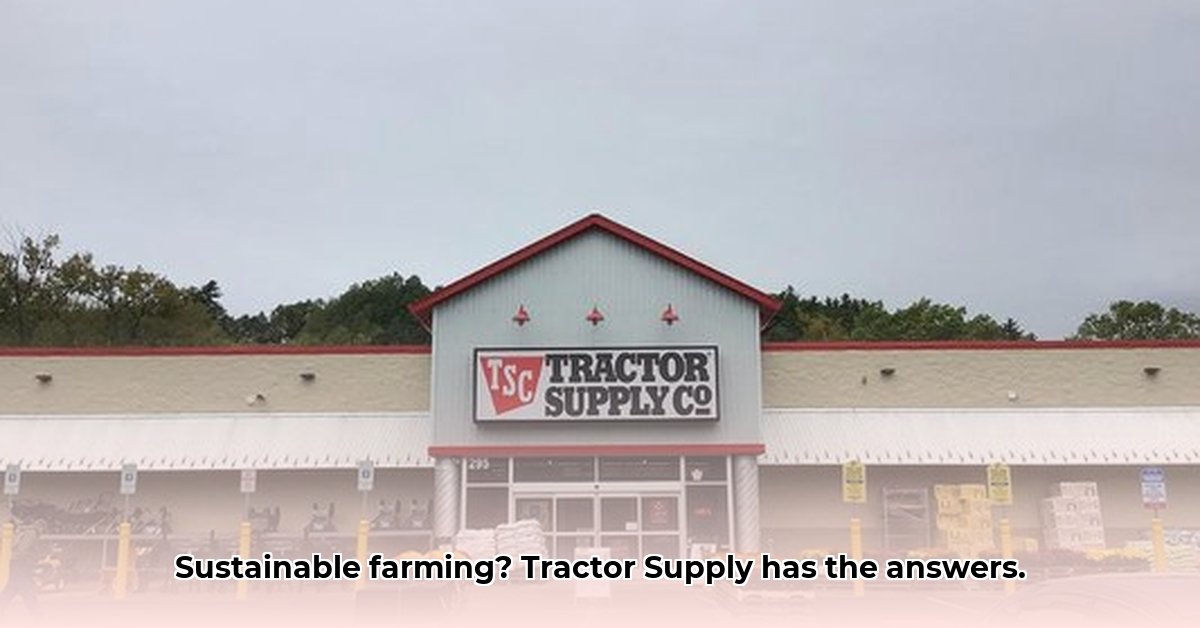
Decoding Tractor Supply's Impact on Sustainable Agriculture in Lake Katrine
Tractor Supply Company (TSC) in Lake Katrine, New York, serves as a central resource for local farmers and gardeners. However, its contribution to sustainable agriculture practices requires closer examination. This article investigates TSC Lake Katrine's product offerings, sustainability initiatives, and community engagement, assessing its current role and potential for future improvements in supporting sustainable farming within the region. We analyze whether TSC’s actions align with the growing demand for environmentally conscious products and practices. For example, consider the sustainability of animal feed, such as alfalfa cubes.
Product Analysis: A Mixed Bag of Sustainability
TSC Lake Katrine offers an expansive product range, from conventional fertilizers and pesticides to animal feed and tools. However, the sustainability of these products varies significantly. Many items lack clear labeling regarding their environmental impacts, hampering informed consumer choices. For instance, the origin of grains in animal feed and the sourcing of lumber for fencing are often unspecified, hindering efforts to assess their ecological footprint. While some products might hint at sustainability—like fertilizers with lower chemical content or "non-GMO" seeds—the lack of widely recognized certifications (USDA Organic, Fair Trade, etc.) leaves considerable room for improvement. This lack of transparency makes it difficult for environmentally conscious consumers to make informed purchasing decisions aligned with their values.
Assessing TSC's Sustainability Efforts: A Critical Evaluation
TSC's website currently lacks a dedicated section highlighting its sustainability initiatives. This lack of clear communication on their environmental policies and goals makes it difficult to judge the depth of their commitment. The absence of prominent in-store signage promoting sustainable products further reinforces this perception. In contrast, effective implementation of clearer labeling and signage, even a dedicated display area for explicitly sustainable products, could dramatically enhance customer awareness and purchasing decisions among consumers actively seeking environmentally friendly options.
Local Impact and Community Engagement: Untapped Potential
TSC Lake Katrine holds significant potential to foster sustainable agriculture within the community. Its strategic location allows for effective partnerships with local farmers and organizations dedicated to sustainable practices.
The store could initiate impactful community engagement initiatives. For example, workshops educating farmers on water conservation techniques, soil health improvement methods, or environmentally friendly pest control strategies could significantly benefit the local agricultural community. Furthermore, sponsorships of local sustainability projects or collaborations with community gardens could strengthen TSC’s commitment to the community and enhance its image as a champion of environmental sustainability. This targeted approach could create mutually beneficial relationships, not only educating consumers but also building strong community ties.
"A collaborative approach between TSC Lake Katrine and local farmers could create a win-win situation," states Dr. Emily Carter, Professor of Agricultural Sustainability at Cornell University. "By sharing knowledge and resources, both parties can contribute to a more vibrant and environmentally responsible agricultural landscape."
Recommendations for Enhancement: Actionable Steps for a Greener Future
To enhance its contribution to sustainable agriculture, TSC Lake Katrine should prioritize the following steps:
Enhanced Product Labeling: Thorough and transparent labeling of products with sustainability certifications (USDA Organic, Fair Trade, etc.) and detailed sourcing information is crucial. This transparency equips consumers to make better choices.
Expanding the Range of Sustainable Products: TSC should proactively seek out and stock a wider variety of certified organic and sustainably sourced products, including seeds, fertilizers, and tools. This will demonstrate a commitment to supporting sustainable practices.
Strengthened Community Engagement: Collaborate with local organizations and farms to host workshops and educational programs focused on sustainable farming techniques.
Improved Transparency and Communication: Publish comprehensive information about its sourcing practices, environmental impact, and sustainability goals on its website and through clear in-store signage. This open communication builds trust and strengthens credibility.
Conclusion: Building a Sustainable Future Together
Tractor Supply Lake Katrine has the potential to become a significant force in promoting sustainable agriculture within the Lake Katrine community. However, realizing this potential necessitates a proactive approach involving significant improvements in product transparency, community engagement, and internal policy. By adopting the recommendations outlined above, TSC can substantially enhance its positive impact on local farms and the environment. The conscious effort to integrate sustainability throughout its business model will ultimately determine its success in creating a more sustainable future for all stakeholders. The community anticipates and deserves a commitment from TSC Lake Katrine towards environmentally conscious practices.